Strengthening Communities
Mr. Johns Hopkins’ bequest was a gift to students, faculty, and patients he would never meet. It was a promise to the people of Baltimore that has only expanded over time.
Fueling a Personal Passion with Professional Prowess
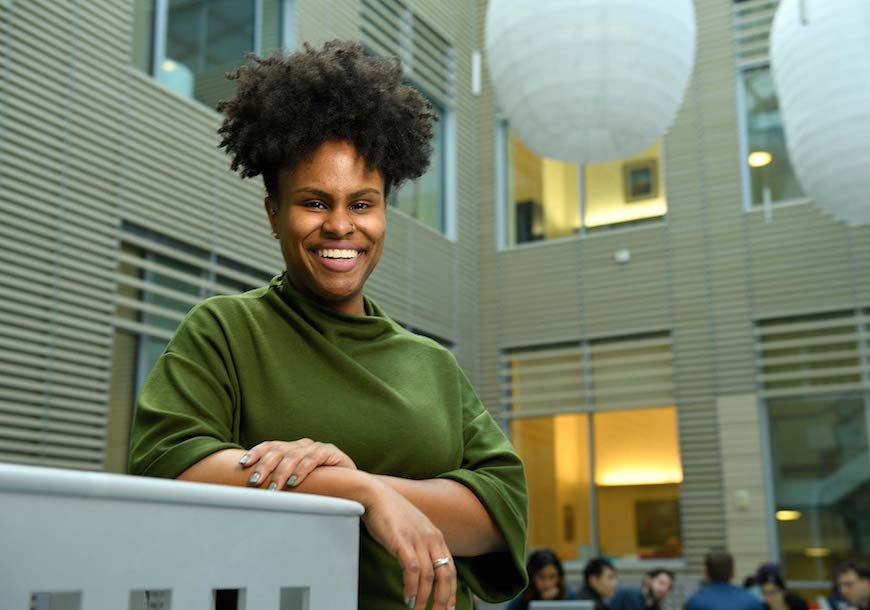
Brooke-Logann Williams, A&S ’15, went to high school 10 minutes from the Homewood campus and attended Johns Hopkins with support from the Baltimore Scholars Program — an initiative that reflects the university’s long-standing investment in Baltimore’s students and schools by providing full-tuition scholarships to any admitted graduates of city public schools.
When the first-generation college student stepped onto campus, she was excited at the opportunity of finding activities that truly suited her. One was the Community Impact Internship Program. Established through a gift from chair of the university’s Board of Trustees Jeff Aronson, A&S ’80, Parent ’13 and ’15, and his wife, Shari, the program offers paid internships with local nonprofit organizations or government agencies. Williams tutored juvenile offenders in the Baltimore City Detention Center and worked with the Office of the Public Defender.
“I was able to dive into the kind of grassroots work I really enjoyed,” she says. “I knew, more than anything, that I had a passion for that work. But I also knew I had to push myself, to learn more so I could better serve the nonprofits I’d come to know and love.”
Today, she’s managing a private family foundation, the J.S. Plank and D.M. DiCarlo Family Foundation, at an investment firm. “I gained a lot of nonprofit experience at Hopkins,” she says. “Now, I’m in a position to be a voice of reason for resources, projects, and programs I’m so proud of. I feel tremendously grateful to give back to my community.”
Access HEARS Improves Quality of Life for Low-Income Adults with Hearing Difficulties
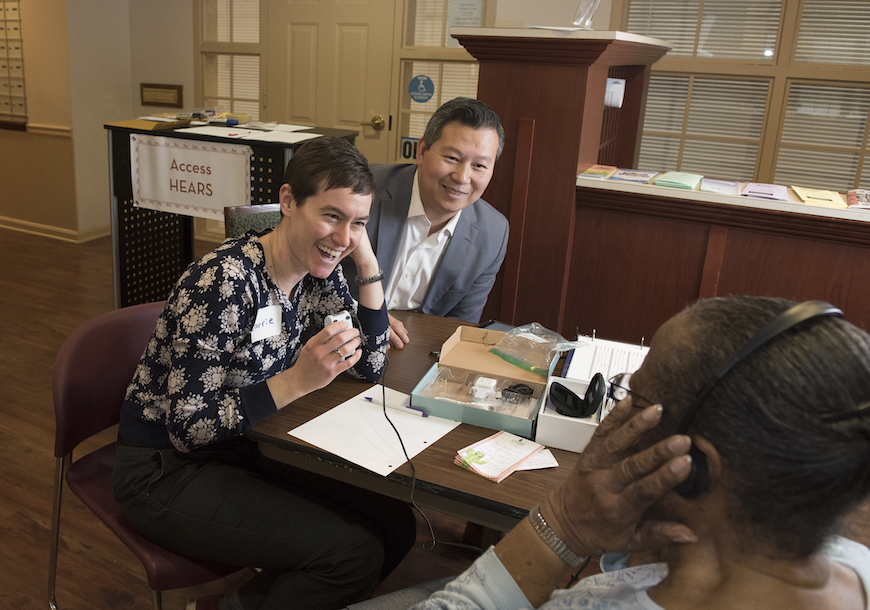
In 2014, Carrie Nieman, an otolaryngology-head and neck surgery resident at the Johns Hopkins Hospital, started a nonprofit to provide affordable amplification devices to low-income older adults, then train those adults how to use the aids. The nonprofit, Access HEARS, drew on research Nieman and her team conducted at Hopkins — but she was wary of an important statistic: it takes an average of 17 years to bring medical innovations to market, according to the Institute of Medicine.
“How can we impact more people, faster?” Nieman asked.
With support from Johns Hopkins Technology Ventures’ Social Innovation Lab, Nieman co-founded Access HEARS with her mentor, associate professor of otolaryngology Frank Lin, and Kunal Parikh, PhD (Engr ’17), and began putting her research into practice. Initial results from a pilot study showed participants had lower levels of hearing handicap and satisfaction levels comparable to individuals using regular hearing aids.
Piloting a “Neighborhood-Based Counterpart” to Gentrification
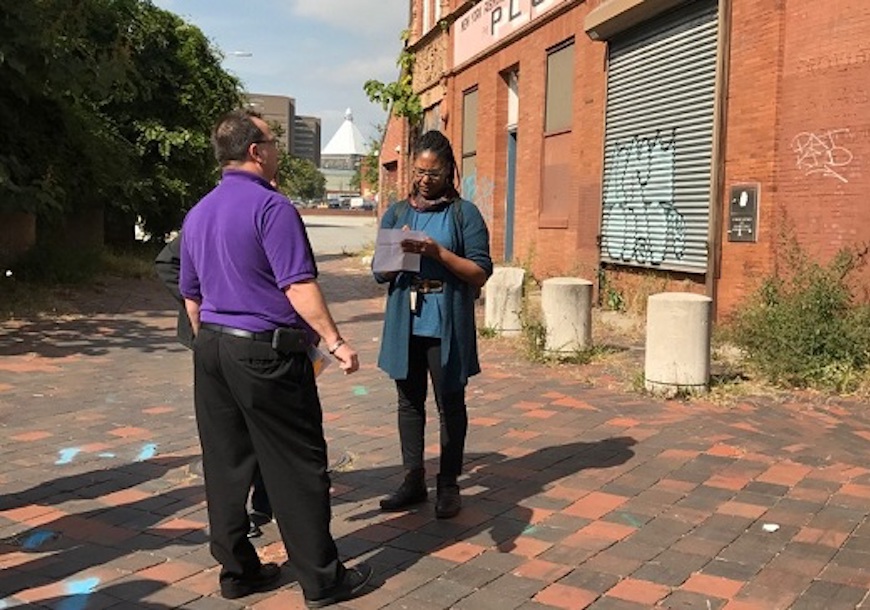
Business with humanity in mind: That’s what the Carey Business School teaches. Few examples exude that mission more than CityLab, a course developed by associate professor Lindsay Thompson, PhD (A&S ’01) in 2013. The course focused on the redevelopment of Jonestown, a struggling but geographically important neighborhood located just north of Carey’s campus on Baltimore’s Inner Harbor.
“The character and quality of business really drives a lot of the values of a community,” Thompson says.
Since then, CityLab students have helped create a master plan for the neighborhood. One alumnus, J.J. Reidy, MBA (Bus ’15), founded Urban Pastoral — originally a hydroponic farm in downtown Baltimore that’s grown into a development firm specializing in urban regeneration. Partnerships with other Baltimore universities and nonprofit groups have broadened CityLab’s horizons well beyond the 16-week course for Hopkins business students.
“We see it as much more than a course now — it’s an urban revitalization collaboratory connecting the emerging entrepreneurial talent of Johns Hopkins students, faculty, and staff with the city’s business, civic, and public sector leaders in building a more livable city that works for everyone,” Thompson says.
Creating an Avenue for Empowerment
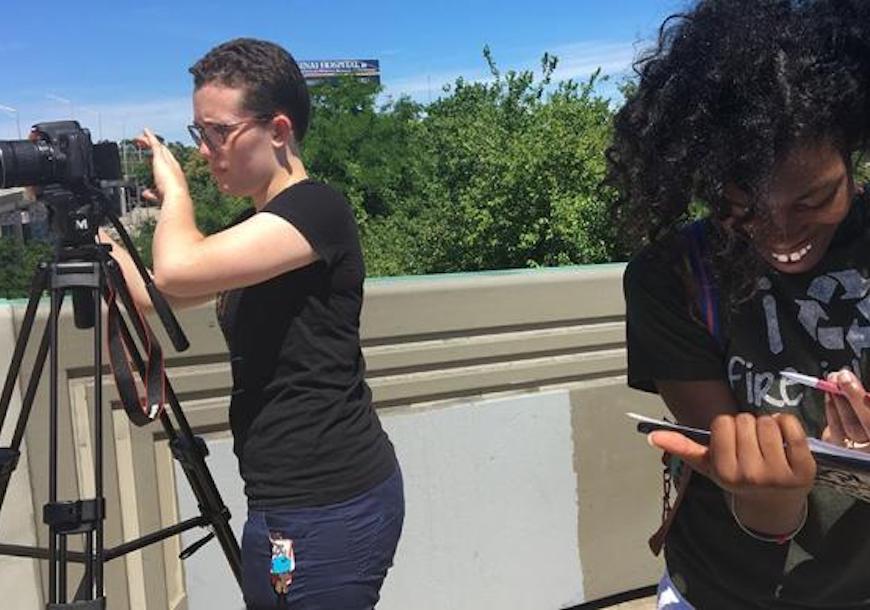
Young people in Baltimore City have a chance to express themselves creatively and build their resumes through an innovative youth filmmaking program.
Made possible by a $1.6 million grant from the Andrew W. Mellon Foundation, the Baltimore Youth Film Arts Program will allow students and young adults from neighborhoods across the city to document their world on film. Through workshops on moviemaking and photography, students create art while they learn technical skills and get professional experience that could lead to long-term jobs in film and television.
“Our city suffers from so many different solitudes that do not connect to one another,” Hopkins President Ronald J. Daniels said in announcing the Mellon Foundation gift. “We believe that by giving cameras and skills to our kids, we create an avenue for empowerment and a foundation these young people can use to help unify our city.”
Thus far, the Baltimore Youth Film Arts program has hosted workshops on social documentary photography, and comedic and digital storytelling. In these sessions, enrolled students work with faculty and teaching assistants from Hopkins’ Film and Media Studies Program, Morgan State University, and the Maryland Institute College of Art, along with other area filmmakers and artists. Several future sessions are being planned.
A Study Linking Eyeglass Use to Improved Reading Ability Expands Beyond Baltimore
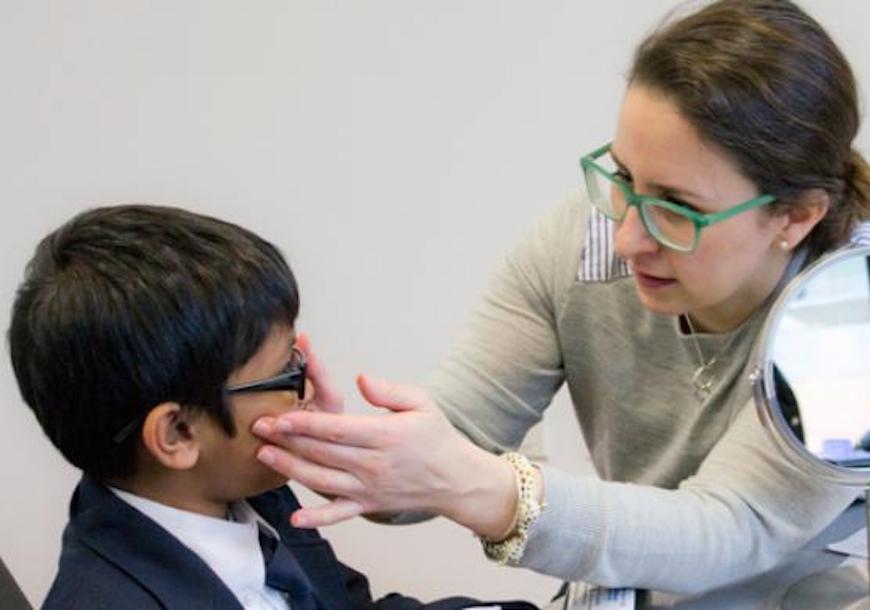
Could a missing link in the educational chain for low-income students be a pair of eyeglasses? The Baltimore Reading and Eye Disease Study (BREDS), supported by the Robert M. and Diane v.S. Levy Foundation, asked that question in 2014. Researchers in the Wilmer Eye Institute and School of Education examined whether providing glasses to students correlated with improvement in the students’ reading scores. But as the study progressed, another question arose: How can schools both provide students access to quality eye care and ensure the children use glasses appropriately to reap the benefits?
“We found that although 30 percent of children we examined had previously worn eyeglasses, roughly six percent of those children still had glasses,” says Robert Slavin, director of Hopkins’ Center for Research and Reform in Education. “What that meant in a city the size of Baltimore was that many children were being held back in school, failing, or perhaps seeking tutoring or other costly services that may only be necessary because they did not have their eyeglasses. Not everyone who’s failing in reading and math in Baltimore is failing because of poor vision, but that’s one relatively solvable part of the problem.”
The program has been able to serve thousands of children in Baltimore and expanded to Chicago in the fall of 2017.
“[Vision for Chicago is] an 80-school research study looking at the impact of an augmented educational intervention campaign from a public health perspective – getting kids to use the program and wear their glasses, building teacher and student engagement, and looking at the long-term impact these efforts have on academic performance,” says Megan Collins, assistant professor of ophthalmology.
Internship Kindles Desire to Stay, Make a Difference in Baltimore

Michelle Abt, a member of the Krieger School of Arts and Sciences Class of 2019, has spent every fall on the volleyball court. But it wasn’t until this summer that she had the chance to connect athletics with another of her passions — and on a different court.
“I’ve never played squash before,” says the volleyball team’s outside hitter. “I, for sure, was getting beat by seventh graders on the daily.”
Abt, a cognitive science major with an interest in education and social policy, spent her summer interning at SquashWise, a non-profit focused on helping Baltimore youth with fitness, nutrition, and literacy. The opportunity to serve her community was made possible through Johns Hopkins’ Community Impact Internships Program, established in 2011 by a generous gift from Shari and Jeff Aronson, A&S ’80, Parent ’13 and ’15, which provides students paid internships with local nonprofit organizations or government agencies.
“It turned out to be a perfect match,” Abt says. “I think investing in students and education is one of the most important things we can be doing. Sport is such a great mechanism for what’s attempting to be taught.”
Growing up in Vienna, Virginia, Abt says she saw issues in the education system. An introductory class into social policy explored issues that extend beyond the classroom, factors like housing and income inequality.
“I felt like I wanted to be in that space,” she says.
In addition to playing squash, Abt’s CIIP appointment also tasked her with creating lesson plans and leading literacy classes.
“I got some actual teaching experience,” she says. “I stood in front of a class and had to adapt to whatever’s going on.
“It very much solidified the fact that I do want to go into teaching, how rewarding it is, and the influence you can have. I’d never done it before,” Abt adds. “It reinforced wanting to work and stay in Baltimore.”
Johns Hopkins in Action: Impacting Baltimore and Beyond
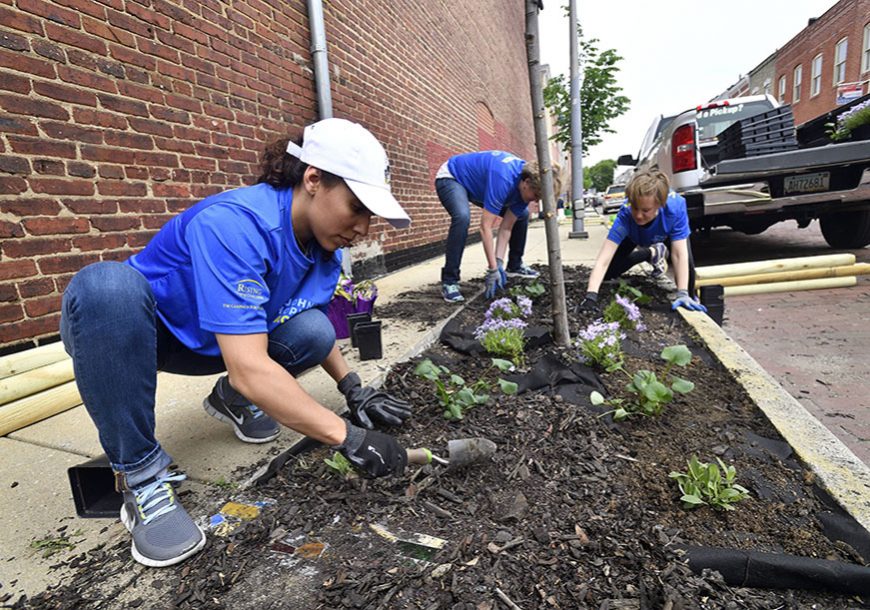
Johns Hopkins in Action (JHiA) began on May 5th, 2013, as a yearly event that would unite the charitable drive of the Johns Hopkins community with the resources of non-profit organizations in the mid-Atlantic. Whether it’s helping at food banks, sorting donated books, or tending gardens, the day gives volunteers the opportunity to engage with local communities and deliver an immediate, positive impact.
“One of the reasons I came to Hopkins is because we focus on using evidence-based solutions to tackle the world’s most difficult problems. It’s important that we also turn that focus toward the city in which we work,” said Paul Ferraro, PhD, a Bloomberg Distinguished Professor with appointments in Carey Business School, the Whiting School of Engineering, and Bloomberg School of Public Health, as he joined efforts in the fourth annual JHiA to clean up the Patapsco River.
Ferraro is one of many Bloomberg Distinguished Professors who have volunteered over the years in Baltimore with his family and colleagues.
“The first step in helping Baltimore is to know the city, and the first step in knowing the city is to be engaged with it and understand its problems,” he said.
Over the span of the Rising to the Challenge campaign, JHiA has grown into an international affair held throughout the year. To date, 2,311 alumni, students, parents, faculty, staff, and friends have clocked in over 9,000 hours of community service through 87 participating organizations.
A promise between JHU and East Baltimore
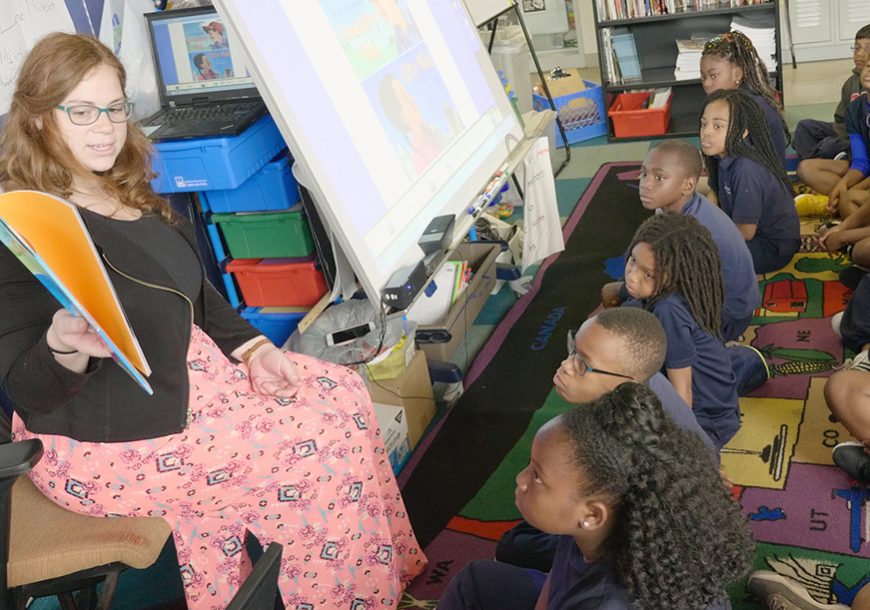
When the Rising to the Challenge campaign began in 2010, Henderson-Hopkins was just an idea. Now, it’s a K through 8 school serving hundreds of students in East Baltimore.
“This was a concept. And Johns Hopkins leaned in with the community as part of the development of East Baltimore to set up an amazing K-8 school,” says Peter Kannam, MEd (Ed ’99), principal of Henderson-Hopkins School. “We now have 500 families who are entrusting us with their students’ lives every day.”
Henderson-Hopkins partners with the Johns Hopkins School of Education, which has provided instructional guidance and helped the school implement a rigorous curriculum for its students, “along with the promise to cadres of students that are active problem solvers, critical thinkers, in a rapidly changing world and economy,” Kannam says.
“And that’s a huge challenge, but a challenge we’re not backing away from.”